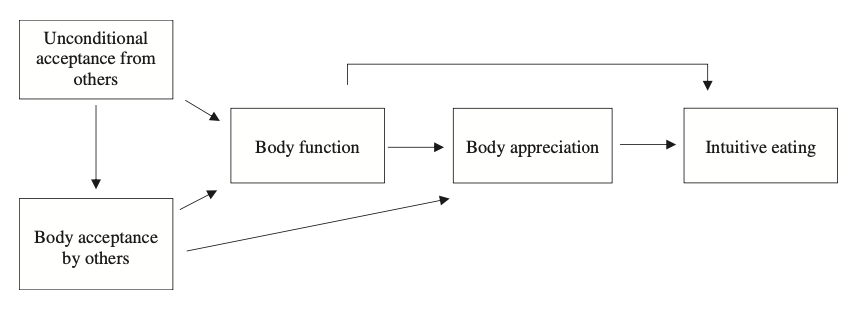*Geek Box: The Acceptance Model of Intuitive Eating
It is easy to think of intuitive eating as a construct purely related to diet, and also to see it is an outcome, i.e., something to develop by reference to dietary behaviours. However, as can be gleaned from certain of the principles of intuitive eating, the body is a crucial aspect of the overall construct, in particular respect for the body, a focus on the body’s function [i.e., exercising for enjoyment], and food choices based on congruence with the body.
Drawing on research from different psychological theories and eating disorders research, Tracy Tylka’s research group developed the ‘Acceptance Model of Intuitive Eating’ [AMIE]. This model drew on humanistic theory, that individuals who receive unconditional acceptance from others are more likely to accept their own self as they are. It also drew on objectification theory, commonly applied in eating disorders research, where the experience of being objectified leads to self-objectification, and ultimately body shame, which manifests as disordered eating/eating disorder.
Take a look at the figure from the present paper, below. In sum, AMIE posits that the experience of body acceptance and/or unconditional acceptance from others reduces self-focus on the body’s appearance, in turn leading to an increased orientation towards body function, i.e., what the body can do. This focus on what the body can do leads to an appreciate for one’s body.
Both a greater focus on the body’s function and increased appreciation for the body contribute to more intuitive eating because the individual is eating for physical rather than emotional reasons, and because they are eating in accordance with their body’s physiological needs [i.e., for exercise].
The research to date, albeit limited, has been suggestive of this direction of effect; that body acceptance by others predicts body function appreciation and bodily self-acceptance, which in turn predicts intuitive eating. However, the research does suggest potential differences according to age [i.e., stronger in early middle-aged women vs. younger adult women], and sex [stronger in women vs. men]. Importantly, prior to the present study there had been no research quantitatively synthesising the available research on the AMIE.

